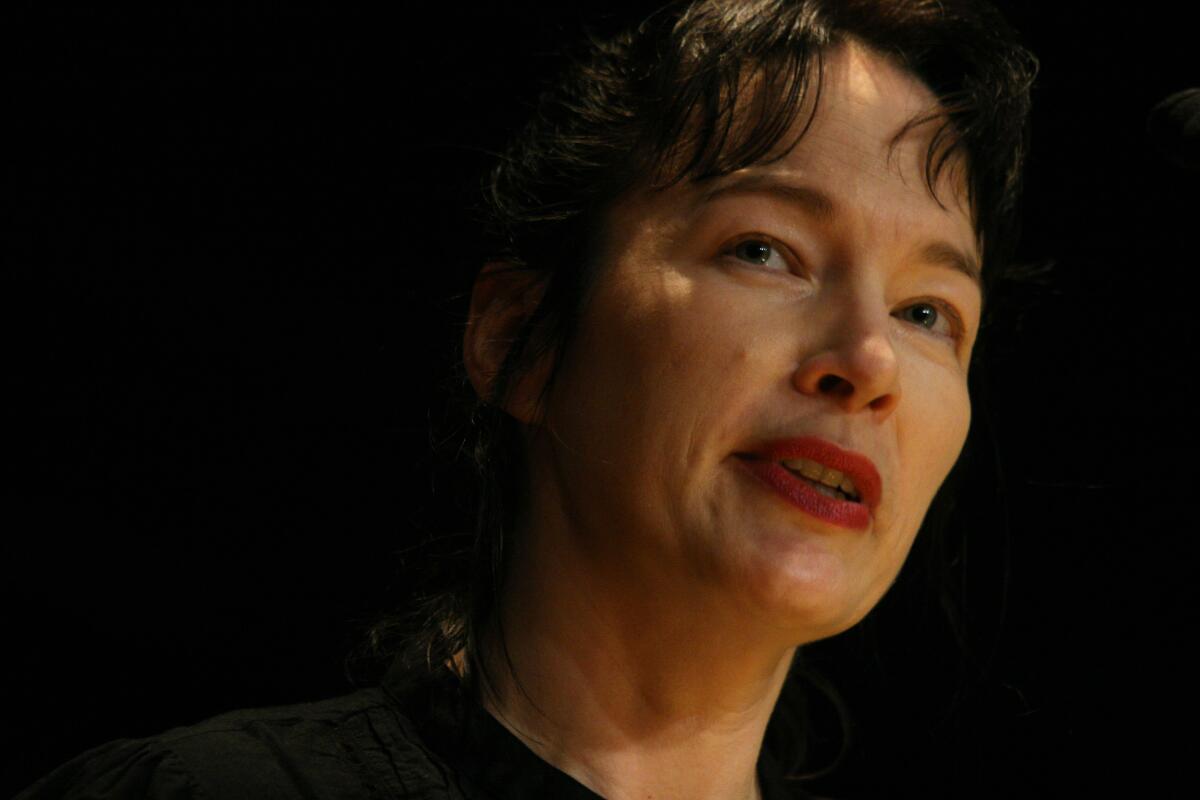Alice Sebold claims she saw no ‘debate’ over racial justice in 1981. I don’t buy it

- Share via
In 1981, Alice Sebold was brutally raped while a freshman in college. The man she accused, Anthony Broadwater, served 16 years in prison. She wrote about the crime and the conviction, based on her identification of Broadwater, in her 1999 memoir, “Lucky.” Sebold went on to become a blockbuster novelist with “The Lovely Bones.” Broadwater, meanwhile, had always proclaimed his innocence. Now, 40 years later, evidence has exonerated him, and he has been cleared of all charges.
On Nov. 30, eight days after the conviction was overturned, Sebold issued a statement on Medium about the case. (Her publisher, Scribner, announced the same day that it was pulling “Lucky” from distribution pending revisions.) Broadwater said through his attorney that he was “relieved that she has apologized.” But to me, her statement read more like a classic apologia, a self-absolving explanation — one vetted, no doubt, by an attorney to avoid admitting liability for Sebold’s pointing to the wrong man in court.
There is the persistent use of the exculpatory passive voice, for one thing. (“I will forever be sorry for what was done to him.”) But the cognitive dissonance I found most galling lay in Sebold’s implication that she could not have known about the racial disparities in the treatment of the accused in the early 1980s.
“American society is starting to acknowledge and address the systemic issues in our judicial system that too often means that justice for some comes at the expense of others,” Sebold writes. “Unfortunately, this was not a debate, or a conversation, or even a whisper when I reported my rape in 1981.”
Sebold apologized to Anthony Broadwater, convicted of her rape in 1982 and exonerated last week. Her publisher announced a pause to consider revisions.
This revisionism does not work, and I believe Sebold knows this because, in a sense, I was there. Sebold and I are both white, both born in 1963; we were both college students in the early ’80s. I grew up fully aware that America treated its Black and white citizens differently. I was in elementary school when Black students were shot to death at Jackson State University while protesting the invasion of Cambodia. I remember being afraid that day because we moved frequently for my father’s job, and I never knew where we’d end up. “I don’t want to move down South,” I said with a child’s logic. “All they do is kill Black people down there.” At 7, I recognized that prejudice had deadly consequences.
And then, like Sebold, I grew up in a decade marked by liberation movements pushing back on that prejudice, a grind of forward progress that ended on a date forever stamped in my memory. It was Nov. 4, 1980. I was 17, a freshman in college in the state of Washington. On that night, the night of Ronald Reagan’s presidential victory and the defeat of several liberal Senate stalwarts, I realized I lived in a country that would rather embrace comfortable fictions than face difficult truths about itself. It felt like a reversal far starker than Trump’s freak victory decades later; it had the affirmation of a large majority who had decided to set aside the ideals of equality and justice for all.
Citizens knew whom they were voting for. Reagan had a track record as governor of California, a long history of dog-whistle politics. In the mid-1970s, he used a single case of welfare fraud to tar poor Black women as “welfare queens” who defrauded social services of millions of dollars. Nevermind that many of those who relied on public assistance were white and many of them lived outside urban areas (as they do today). Reagan used the politics of racial resentment to stoke white anger.
Sure, Sebold was only in college then — so was I. But connecting Reagan’s victory to racial retrenchment was not a matter of inside baseball. One of his most widely covered and divisive campaign events was a stop in Neshoba County, Miss., the same place where three civil rights workers were murdered by white supremacists in 1964. His full-throated defense of “states’ rights” in a state that had used the 10th Amendment to justify its unequal treatment of its citizens was not an accident — and its symbolism was understood at the time to be an appeal to white racists. Reagan campaigned with notable segregationists. Jimmy Carter implied his opponent was running a racist campaign, then backtracked after being accused of fomenting division (a common counterpunch of the called-out, then and now).
Want to understand how we got to 2020? Look to the 1980s — and two recent books: Kurt Andersen’s ‘Evil Geniuses’ and Rick Perlstein’s ‘Reaganland.’
What does all this have to with a memoirist who suffered a terrible assault? The point is that these arguments were out in the open, these wounds fresh, when Sebold was asked to pick a man out of a lineup. If it was not the subject of “debate” or “conversation,” that was only because Americans had voted, just a year earlier, to shut the door on it. They had voted for an America where the words of the old cowboy song, declaring “It’s your misfortune and none of my own,” would become national policy. Many of them may have closed their eyes, but I find it close to impossible to believe that an educated young woman like Sebold was oblivious. And if she was, she has something else to atone for.
I am deeply sorry for the pain Sebold suffered and the trauma of her rape. I also believe she is deeply sorry that the wrong man was convicted of the crime. I am happy to hear Broadwater finds her apology sincere, and I accept that her language is constrained, perhaps by fear of litigation. But her insistence that Americans didn’t know better in 1981 than to place their full faith in a justice system that pressured her to identify the wrong suspect — that is patently false.
If Sebold is sincere, she must offer Anthony Broadwater more than carefully crafted words. Irreparable harm was done, whether she intended it or not. It feels necessary that Sebold do something that feels like reparative justice.
While the ultimate call on what would constitute proper contrition should rest with Broadwater, I have a suggestion. Sebold could make a sizable donation to an organization like The Innocence Project, which works to free those who have been wrongfully convicted. Or she could establish her own foundation, perhaps one that helps the formerly imprisoned reenter society as Broadwater struggled to do in the face of intense ostracism and lost opportunities.
Whatever she does, the uncomfortable fact is that, lawyered statement or not, Sebold is liable for the harm she caused — if not legally, then morally. Those who suffer trauma are not excused from inflicting trauma on the innocent. And pretending we didn’t know better — as a society and as individuals — is an insult to those of us who did and further injury to those we all victimized.
8 books you should read instead of “Hillbilly Elegy.”
Berry writes for a number of publications and tweets @BerryFLW.
More to Read
Sign up for our Book Club newsletter
Get the latest news, events and more from the Los Angeles Times Book Club, and help us get L.A. reading and talking.
You may occasionally receive promotional content from the Los Angeles Times.









